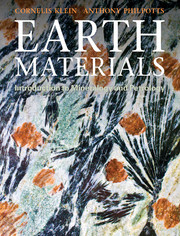Book contents
- Frontmatter
- Contents
- Preface
- Acknowledgments
- Chapter 1 Introduction
- Chapter 2 Materials of the solid Earth
- Chapter 3 How are minerals identified?
- Chapter 4 Fundamentals of crystal structures
- Chapter 5 Introduction to crystallography
- Chapter 6 Minerals and rocks observed under the polarizing optical microscope
- Chapter 7 Igneous rock-forming minerals
- Chapter 8 How do igneous rocks form?
- Chapter 9 Igneous rocks
- Chapter 10 Sedimentary rock-forming minerals and materials
- Chapter 11 Formation, transport, and lithification of sediment
- Chapter 12 Sedimentary rock classification, occurrence, and plate tectonic significance
- Chapter 13 Metamorphic rock-forming minerals
- Chapter 14 Metamorphic rocks
- Chapter 15 Some economic minerals, mainly from veins and pegmatites
- Chapter 16 Some selected Earth materials resources
- Chapter 17 Earth materials and human health
- Glossary
- Minerals and varieties
- Common igneous, sedimentary, and metamorphic rocks
- Index
Chapter 10 - Sedimentary rock-forming minerals and materials
- Frontmatter
- Contents
- Preface
- Acknowledgments
- Chapter 1 Introduction
- Chapter 2 Materials of the solid Earth
- Chapter 3 How are minerals identified?
- Chapter 4 Fundamentals of crystal structures
- Chapter 5 Introduction to crystallography
- Chapter 6 Minerals and rocks observed under the polarizing optical microscope
- Chapter 7 Igneous rock-forming minerals
- Chapter 8 How do igneous rocks form?
- Chapter 9 Igneous rocks
- Chapter 10 Sedimentary rock-forming minerals and materials
- Chapter 11 Formation, transport, and lithification of sediment
- Chapter 12 Sedimentary rock classification, occurrence, and plate tectonic significance
- Chapter 13 Metamorphic rock-forming minerals
- Chapter 14 Metamorphic rocks
- Chapter 15 Some economic minerals, mainly from veins and pegmatites
- Chapter 16 Some selected Earth materials resources
- Chapter 17 Earth materials and human health
- Glossary
- Minerals and varieties
- Common igneous, sedimentary, and metamorphic rocks
- Index
Summary
In the prior three chapters (Chapters 7–9), we addressed many aspects of minerals and rocks of igneous origin. They are the result of crystallization from a liquid magma over a wide range of high temperatures (~1400 to 600°C) in an environment in which oxygen gas (O2) is nonexistent and in which H2O is generally a minor constituent. This chapter deals with minerals that (1) are newly formed as a result of chemical reactions (under atmospheric conditions) that slowly destroy earlier minerals (e.g., feldspars) and recombine various ions in solution in water to form clay minerals, and oxides or hydroxides, and (2) those that are chemical precipitates in depositional basins such as carbonates, evaporite minerals, and Precambrian iron-formations. However, we must also mention those minerals that have survived the physical and chemical weathering processes while exposed to the atmosphere; these are known as detrital minerals.
We systematically treat 13 sedimentary rock-forming minerals. These include ice, the solid form of H2O; a hydroxide; a clay mineral (representative of the large clay mineral group); two polymorphs of CaCO3; four more carbonates; two halides; and two sulfates. Clearly, this group of common sedimentary minerals is totally different from the igneous rock-forming minerals discussed in Chapter 7.
- Type
- Chapter
- Information
- Earth MaterialsIntroduction to Mineralogy and Petrology, pp. 288 - 307Publisher: Cambridge University PressPrint publication year: 2012
- 1
- Cited by



